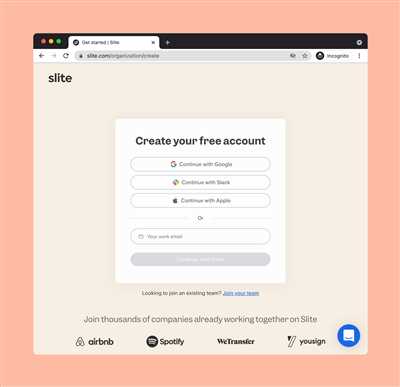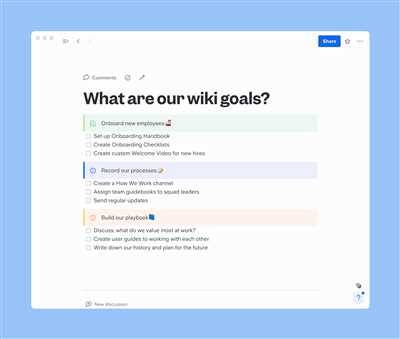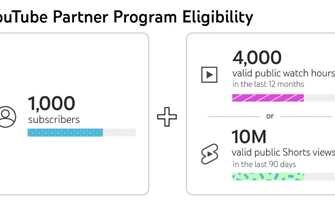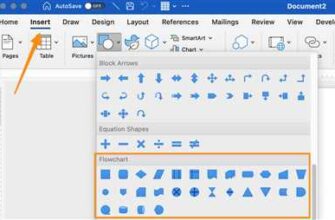
If you have a need to drive collaboration and knowledge sharing within your team or company, creating your own wiki is the way to go. Here, we will guide you through the basics of how to make your own wiki, whether it’s for a non-profit organization, a game, or an enterprise. With a wiki, you can help develop a powerful knowledge base that saves time and gives your team easy access to important documents without the need to always be online.
One of the key advantages of creating your own wiki is that you have complete control over who can access and edit its contents. You can give different levels of permissions to your users, allowing them to edit, share, or simply view the information. This flexibility is especially useful when you want to create a private wiki for your internal teams or a public one to share knowledge with others.
Unlike other wikis, such as the most well-known one, Fandom, launching your own wiki gives you the freedom to customize its features and design according to your needs. You can create multiple pages, categorize information, and even develop custom templates to make the wiki more intuitive and user-friendly. By having your own wiki, you can also copy information from other wikis easily, without restrictions, and use it to foster collaboration within your team or company.
So, if you’re ready to start your own wiki, check out our step-by-step guide on how to create a wiki. From choosing the right platform and setting up your account to organizing and sharing knowledge, we’ll cover it all. Whether you’re a beginner or have previous experience with wikis, this guide will provide you with the advice and tips you need to create a successful wiki that meets your goals.
How to Create a Wiki for Your Company or Team
Creating a wiki for your company or team can be a game-changer. It saves time, increases collaboration, and helps develop a knowledge base for your organization. Whether you’re a non-profit, enterprise, or small team, a wiki can give you unlimited power to document and share information.
Why Use a Wiki?
A wiki is more than just a glorified document storage. It allows users to easily edit and collaborate on content, making it a powerful tool for teams. With a wiki, employees can access information quickly, without the need to constantly ask others for help.
When it comes to creating a wiki, one of the most important things to consider is permissions. You want to make sure that only authorized individuals have access to certain pages and that others can view and edit them without any issues.
How to Get Started

Before you dive into creating your wiki, here are some quick tips to guide you through the process:
- Check out other wikis – Before creating your own, it’s always helpful to see how others have structured their wikis. This will give you a better idea of what features and content you can include in your own.
- Decide on a platform – There are many wiki platforms available, both free and paid. Some popular options include MediaWiki, Confluence, and SharePoint, among others. Choose one that best suits your needs and budget.
- Create an account – Once you’ve selected a platform, create an account and sign in. This will give you access to the necessary tools and features to build your wiki.
- Define the basics – Before adding any content, decide on the structure and organization of your wiki. Think about how you want to categorize information and create clear guidelines for users to follow.
- Start adding content – Now it’s time to start populating your wiki with content. Begin by creating the essential pages and gradually add more as needed. Make sure to give proper attribution to any external sources you use.
- Customize your wiki – Most wiki platforms offer customization options to make your site unique. Add your company or team logo, choose a color scheme, and customize the layout to match your branding.
- Share with your team – Once your wiki is ready, it’s time to share it with your team. Provide them with access and guide them on how to use the wiki effectively. Encourage collaboration and feedback to continually improve the content.
By following these steps, you’ll be well on your way to creating an efficient and valuable wiki for your company or team. Enjoy the benefits of easy access to knowledge and streamlined collaboration.
Develop your game wiki with a team

If you’re developing a game, having a wiki can be an invaluable resource for your team. A wiki allows users to easily create, edit, and share content, making it the perfect platform for collaboration. Whether you’re working on an enterprise game or a non-profit project, a game wiki can help drive knowledge sharing and team collaboration.
Before you start creating your game wiki, there are a few basics you need to know. First, you’ll need to decide whether you want to use an online wiki platform or create a custom wiki on your own. Online platforms like Fandom or Wiki.com offer many features and unlimited pages, which can save you time and effort. However, if you want more control over the design and features of your wiki, creating a custom wiki may be the better option.
Once you’ve decided on the platform for your game wiki, you can give your team access to the wiki. This will allow them to create and edit pages, share their knowledge, and collaborate with others. You can also set up different permissions for your team members, giving them varying levels of access to certain pages or features.
When you launch your game wiki, it’s important to provide clear guidelines and advice for your team. This will help them understand how to best contribute to the wiki and how to make the most of its powerful features. You can also create templates and guidelines for worldbuilding, character development, and gameplay mechanics, making it easier for your team to create consistent and cohesive content.
Having a game wiki can also be a valuable resource for others outside of your team. It can serve as a hub for fans, players, and other developers to access information about your game. By making your wiki public or allowing certain users to access it, you can create a community-driven resource that saves time and effort when answering questions or providing support.
Remember, when developing your game wiki, always prioritise the privacy and security of your content. Make sure to create a private wiki if you’re working on a sensitive project or if you want to keep your content internal. This will ensure that only authorized users have access to your wiki.
In conclusion, developing a game wiki with a team can greatly improve collaboration and knowledge sharing. By creating a platform where people can easily create, edit, and share content, you’ll not only make your team’s work more efficient, but you’ll also provide a valuable resource to others. So, before you dive into your game development, consider how a wiki can help you and your team.
Basics edit
When creating your own wiki, one of the most important features to consider is the ability for people to edit and collaborate on content. Whether you’re creating a wiki for a private team, a non-profit organization, or even for personal use, the ability for others to edit and contribute to your wiki is essential for sharing knowledge and developing content.
Before you launch your wiki, it’s important to decide on the permissions and access levels that you want to give to others. You can choose to allow anyone with an account to edit your wiki, or you can limit editing permissions to a select group of users. This is particularly useful for internal company wikis or wikis that require strict control over content.
Creating a wiki that allows for easy editing and collaboration is simple. Many online platforms offer wiki services that are quick to set up and easy to use. One popular option is Fandom, which allows users to create their own wikis on a variety of topics. Another option is MediaWiki, which is a powerful software that saves content in a document format and allows for unlimited pages and customization.
When it comes to editing content, most wikis provide a user-friendly interface that allows for easy editing without the need for technical skills. To edit a page, simply click on the “Edit” button or link on the wiki page. This will open a text editor where you can make changes to the content. Once you’re done editing, you can save your changes and the updated content will be visible to other users.
To help users edit content more easily, wikis often provide features like a revision history, which allows you to see all the changes that have been made to a page over time. This can be useful for tracking edits and reverting to previous versions if needed. Some wikis also offer the ability to discuss changes with other users, which can facilitate collaboration and provide a space for feedback and advice.
When creating a wiki, it’s always a good idea to check the site’s documentation or user guide for specific instructions on how to customize your wiki’s editing features. Depending on the platform or software you’re using, there may be additional options and settings that you can configure to better meet the needs of your team or organization.
In summary, the basics of editing a wiki involve giving others permission to edit your wiki, creating a user-friendly interface for editing and collaborating on content, and utilizing features like revision history and discussion forums to enhance the editing process. With these basics in mind, you can create a powerful wiki that saves time, facilitates collaboration, and shares knowledge with your team or the wider world.
Other advice
Before you jump into creating your own wiki, here are some other important things to consider:
| Internal vs. External | Decide whether your wiki will be internal (only accessible to your team or organization) or external (available to the public). This will determine the level of privacy and permissions you need to set up. |
| Choose the right platform | There are many wiki platforms available to choose from. Consider the features, customization options, and collaboration capabilities that best fit your needs. |
| Develop a content guide | Before launching your wiki, create a content guide that outlines the basics of what can and cannot be included. This will help maintain the quality and consistency of the content. |
| Give appropriate permissions | Set up different permission levels for users, depending on their roles and responsibilities. This will ensure that only authorized individuals can edit and access certain pages. |
| Consider non-profit or enterprise options | If you’re creating a wiki for a non-profit organization or a large company, there may be specialized options available that cater to these specific needs. |
| Check for existing content | Before creating a new wiki, check if there are already similar wikis or online resources available on the topic you are focusing on. It’s always helpful to save time and collaborate with others. |
| Share and collaborate | A wiki is a powerful tool for knowledge sharing and collaboration. Encourage your team or community to contribute and edit the content, making it a collective effort. |
| Copy from reliable sources | When adding information to your wiki, make sure to cite and credit the original sources. This will ensure the accuracy and credibility of the content. |
Following these pieces of advice will help you create a successful and useful wiki that not only serves as a central hub of knowledge but also fosters collaboration among your team or community.









